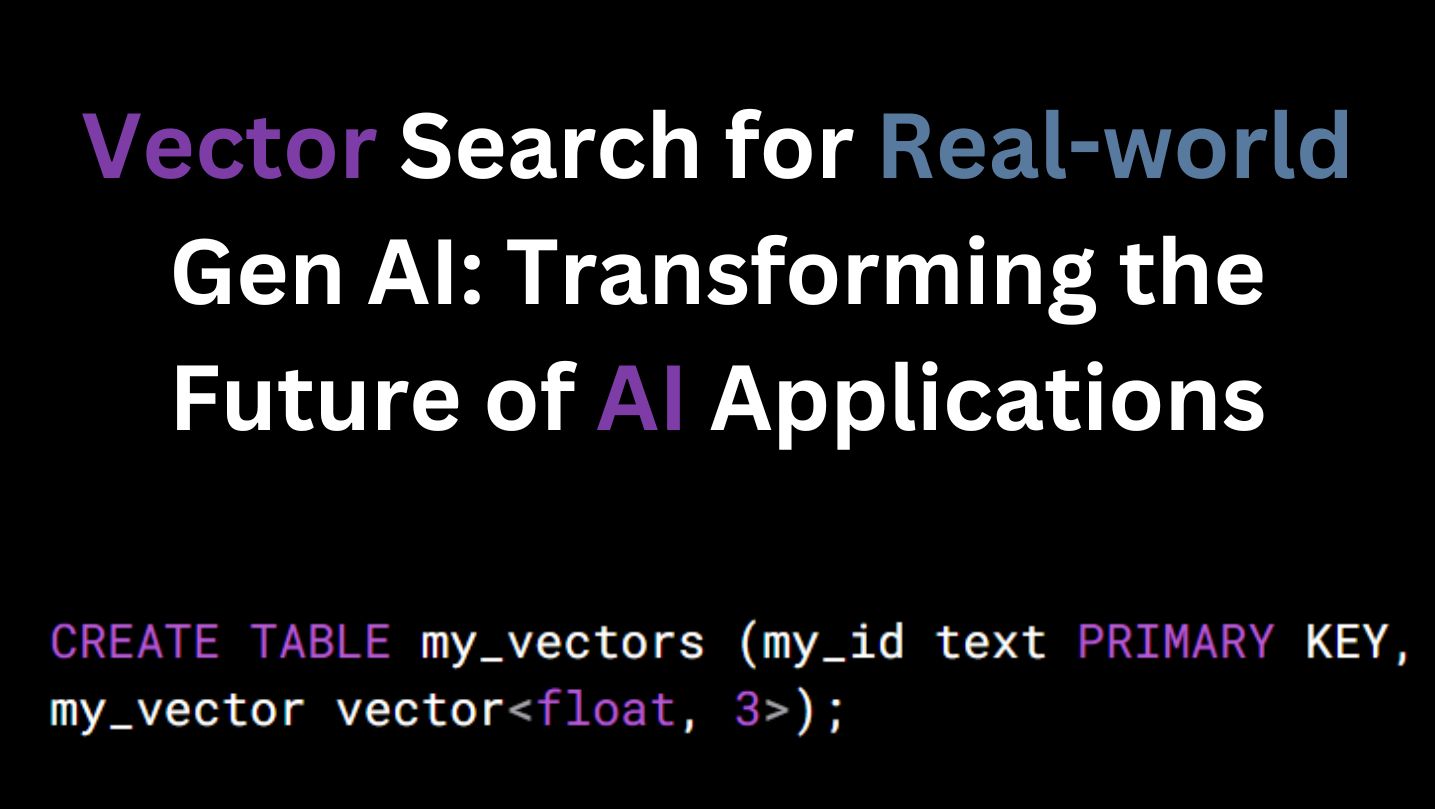In the realm of artificial intelligence, the quest for more advanced and intuitive applications has led to the development of Gen AI, a new generation of AI systems. These systems, often leveraging deep learning and neural networks, aim to make AI more adaptable and capable of understanding complex real-world scenarios. At the heart of this AI revolution is vector search, a transformative technology that has the potential to reshape how Gen AI interacts with and comprehends the world around us. In this blog, we’ll explore the role of vector search in Generative AI and the real-world implications of this groundbreaking technology.
Gen AI: Pioneering a New Era of AI
Gen AI represents a significant leap forward in the world of artificial intelligence. Unlike its predecessors, which often relied on specific predefined rules or narrowly focused machine learning models, Gen AI is designed to be more versatile and adaptable. It can understand and respond to a broader range of inputs, make decisions in complex situations, and learn from a wide array of data sources.
To accomplish these tasks effectively, Gen AI needs a more sophisticated and context-aware understanding of the data it processes. This is where vector search in Generative AI comes into play.
The Role of Vector Search in Gen AI
Vector search is a technology that enables AI systems to understand and interpret data by mapping it into a high-dimensional vector space. Within this vector space, data points, words, or concepts are represented as vectors, and their positions relative to one another capture semantic relationships. This allows AI systems to grasp context, meaning, and associations in a way that traditional data structures or keyword-based methods cannot.
So, how does vector search contribute to Gen AI’s capabilities? Let’s explore several key areas:
1. Natural Language Understanding:

Gen AI is expected to excel in natural language understanding, enabling more human-like interactions with users. Vector search, with its ability to capture semantic relationships between words and phrases, plays a pivotal role in this endeavor. AI systems can understand not only the words themselves but also the context in which they are used, allowing for more accurate and context-aware responses.
2. Contextual Decision-Making:
Gen AI is not limited to simple tasks but is designed to make more complex decisions in real-world scenarios. Vector search contributes to this capability by providing context awareness. AI systems can analyze the context of a situation, consider multiple factors, and make informed decisions based on a deeper understanding of the data at hand.
3. Multimodal Data Processing:
The real world is rich with data in various formats, from text and images to audio and video. Gen AI needs to handle multimodal data seamlessly. Vector search extends its capabilities to different data types, allowing AI systems to process and understand the meaning of text, images, and other content, even when used together in a single query.
4. Learning and Adaptation:
Gen AI is expected to be a lifelong learner, continuously improving its performance. Vector search provides the foundation for adaptive learning. By updating embeddings in real-time, AI systems can adapt to changing user behavior, evolving data, and emerging patterns, ensuring that their understanding remains up-to-date and relevant.
Real-world Implications of Gen AI with Vector Search
The combination of Gen AI and vector search has far-reaching implications for various real-world applications:
- Healthcare: Gen AI can assist medical professionals in diagnosing diseases and recommending treatment plans. It can analyze a patient’s medical history, laboratory results, and clinical notes, aided by vector search to understand the context and relationships within these data sources.
- Autonomous Vehicles: In the realm of self-driving cars, Gen AI with vector search can enhance the vehicle’s understanding of its surroundings. It can interpret data from sensors, cameras, and maps, making real-time decisions based on a deep understanding of traffic patterns, pedestrian behavior, and road conditions.
- Financial Services: Gen AI can transform the financial industry by making smarter investment decisions, detecting fraudulent activities, and providing personalized financial advice. Vector search allows the system to process vast datasets and understand financial market dynamics more effectively.
- E-commerce: Online shopping experiences will become more personalized and intuitive with Gen AI and vector search. Gen AI can understand user preferences and make product recommendations based on user interactions and the semantic relationships between products.
- Customer Support and Chatbots: Gen AI-powered chatbots can provide more intelligent and context-aware responses to customer inquiries. Vector search ensures that the chatbot understands the nuances and context of customer questions, leading to improved user satisfaction.
- Content Creation: Gen AI can assist content creators by suggesting relevant content topics, helping with content generation, and offering real-time feedback on content quality. Vector search plays a crucial role in understanding the content landscape and user preferences.
Challenges and Considerations

While Gen AI with vector search holds immense promise, it also faces challenges. These challenges include data privacy concerns, the risk of bias in decision-making, and the need for more robust ethical guidelines. As Gen AI becomes increasingly integrated into real-world applications, addressing these challenges will be crucial to ensure that the technology benefits society as a whole.
In Conclusion: The Revolution of Gen AI with Vector Search
Gen AI represents a paradigm shift in the world of artificial intelligence, pushing the boundaries of what AI systems can understand and achieve in the real world. Vector search, with its ability to capture semantic relationships and provide context-aware understanding, plays a pivotal role in making GenAI more adaptive, versatile, and intuitive.
As Gen AI continues to evolve, we can expect to see transformative changes in various industries, from healthcare to finance and e-commerce. With its deep understanding of data and the context in which it is used, GenAI with vector search promises to enhance decision-making, provide more personalized experiences, and make AI a truly invaluable part of our daily lives. However, it is essential to address ethical considerations and ensure that this technology is used responsibly for the benefit of society as a whole.
About the Author
William McLane, CTO Cloud, DataStax
With over 20+ years of experience in building, architecting, and designing large-scale messaging and streaming infrastructure, William McLane has deep expertise in global data distribution. William has history and experience building mission-critical, real-world data distribution architectures that power some of the largest financial services institutions to the global scale of tracking transportation and logistics operations. From Pub/Sub to point-to-point, to real-time data streaming, William has experience designing, building, and leveraging the right tools for building a nervous system that can connect, augment, and unify your enterprise data and enable it for real-time AI, complex event processing and data visibility across business boundaries.
See Also: Empowering Tech Excellence: Navigating Innovation Training










